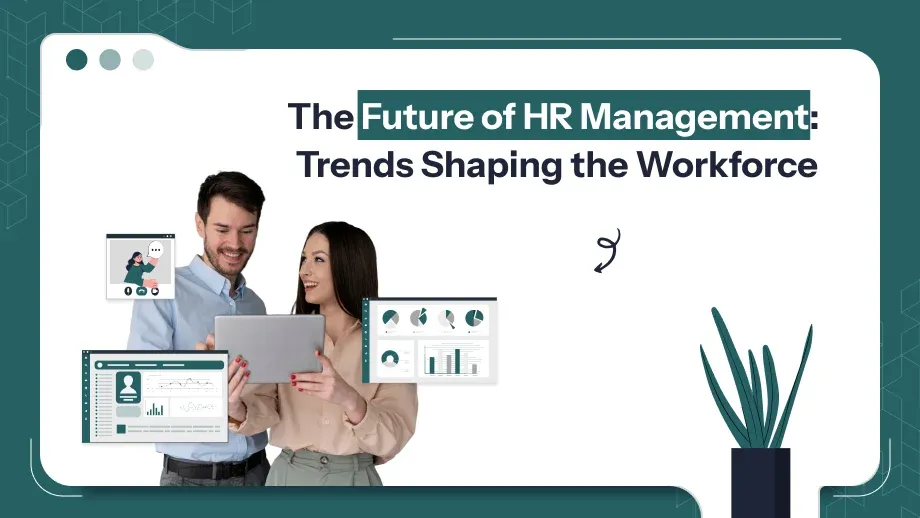
The future of hr management is no longer a buzzword but a reality that organizations around the world need to address. Rapid technological advancements, shifting workforce expectations, and the globalized nature of work are reshaping how businesses approach human resource management system. But what does this transformation entail, and how can companies prepare for it?
What’s Next for HR Management in the Future?
This would mean that HR would be all about technology, strategy, and people. In essence, this would prepare the organizations for the changing world in the workplace. It would not only be automation adoption but the management of a hybrid team to become a highly dynamic field balancing efficiency with the satisfaction of the employees.
What is Driving the Future of HR Management?
Several forces are shaping the future of human resource management, each presenting unique opportunities and challenges:
- Technological advancements Artificial intelligence, machine learning, and automation are changing the nature of HR functions. From AI-based recruitment tools to HRMS payroll software in India, technology has streamlined processes, enhanced decision-making, and improved efficiency.
- With remote work, hybrid models, and gig-based employment, changes are required in the HR function to manage the new dynamic of a diverse and dispersed workforce.
- Employees expect much more personalization in their career paths, mental health resources, and work-life balance. Employee onboarding software and attendance management software play a huge role in that.
Challenges in the Future of HR Management
The future of HR is one full of promise, but it also holds more than its fair share of challenges that HR teams must navigate to stay effective and relevant. As organizations begin embracing new technologies, manage a diversified workforce, and align with changing employee expectations, the future isn’t without its share of hurdles. Here is a closer look at the future challenges of HR and how to come around them.
Resistance to Technology Adoption
Many organizations struggle with adopting human resource management tools due to resistance from employees who are unfamiliar with these systems or hesitant to change.
Balancing Automation with Human Touch
While tools like cloud HRMS solutions and HRMS payroll software in India automate repetitive tasks, HR teams must ensure personal connections with employees are not lost.
Data Security Concerns
As HR relies more on digital tools, protecting sensitive employee data stored in HRMS solutions is a growing concern that requires robust cybersecurity measures.
Managing Hybrid and Remote Workforces
With the rise of hybrid models, HR teams need tools like attendance management software to ensure smooth operations and maintain employee engagement.
Addressing Employee Well-being
The future of HR management features employee welfare, but creating effective wellness programs that relate to mental and physical health is much more difficult.
Upskilling and Reskilling Employees
The world of future HR automation will demand HR employees continue developing their skills to meet new responsibilities on the job site in the future.
What does the future of HR management hold?
Learn about the trends and tools shaping tomorrow’s workforce!
Diversity, Equity, and Inclusion
Alignment with strategies of doing business is challenging though achieving DEI goals measureably is much expected in future Human Resources Management.
Retaining Top Talent
With increasing job mobility, retaining high-performing employees is a growing challenge. Tools like employee onboarding software can improve initial engagement and retention.
Adapting to Future HR Trends
HR teams often find it hard to keep ahead of future HR trends, including AI integration and real-time analytics.
Managing Generational Diversity
To cater to the needs of a multi-generational workforce from Gen Z to Baby Boomers, flexible policies and innovative approaches are required.
Emerging Trends in the Future of HR Management
The future of human resource management is being defined by these critical trends:
Automation in HR Processes
Automation is transforming routine HR tasks such as payroll, attendance tracking, and compliance management. Companies using cloud hr software are reducing errors and freeing up HR teams for more strategic work.
Data-Driven Decision Making
HR teams are using analytics to predict employee turnover, identify high performers, and tailor training programs. Tools such as human resource management tools play a significant role in these initiatives.
Employee Well-being
Future-focused organizations are investing in mental health resources, flexible work arrangements, and personalized benefits to boost engagement and retention.
Diversity, Equity, and Inclusion
The future HR trends emphasize the importance of building inclusive workplaces. By using analytics and employee feedback systems, HR teams can measure and improve DEI initiatives.
Upskilling and Reskilling
As technology evolves, so do job requirements. Upskilling employees in digital tools and soft skills ensure they stay relevant in their roles.
Key Trends Defining the Future of HR Management
The Role of Automation in HR
Automation is taking over repetitive tasks like payroll processing, attendance tracking, and compliance management. Using tools like HRMS payroll software in India, organizations are saving time and reducing errors. This not only improves productivity but also allows HR professionals to focus on more strategic activities.
Data-Driven HR Practices
The future of HR is very data-driven. Advanced analytics tools help the HR team better predict trends, benchmark performance, and make informed decisions. For instance, it can identify high-performing employees or predict when an employee might leave, helping businesses make proactive moves.
Emphasis on Employee Experience
Today’s workforce expects more than just a paycheck. Companies are focusing on creating a positive employee experience through initiatives like personalized career growth plans, wellness programs, and flexible work arrangements. Tools such as employee onboarding software are being used to ensure that employees feel welcomed and valued from day one.
Hybrid Workplaces and Remote Teams
The pandemic has accelerated the trend of hybrid and remote work. Managing distributed teams is one area where HR pays much attention to. Attendance management software and other cloud HRMS solutions ensure efficient operations and collaboration among locations.
Diversity, Equity, and Inclusion
Building a diverse and inclusive workplace is a priority in the future of HR in India and around the world. Using tools and feedback mechanisms, HR teams are tracking DEI efforts and ensuring fair opportunities for everyone.
How HR Teams Can Prepare for the Future?
The way forward for human resource management would require organizations to focus on key areas, including:
Adopting Technology:
Investment in advanced HR tools such as HRMS payroll software in India will help businesses stay ahead of the curve. Such tools automate routine tasks, provide analytics, and simplify compliance management.
Upskilling Employees:
Encouraging employees to learn new skills is crucial in a fast-changing world. This includes technical skills for automation and soft skills for collaboration.
Focusing on People-First Policies:
Employee-centric initiatives like wellness programs, career development plans, and flexible working policies form an imperative part of the organizational strategy.
Leveraging Data:
Analytics tools make available deep insights to HR teams about workforce trends, performance, and employee satisfaction, helping businesses be abreast of upcoming future HR trends.
Why the Future of HR Management is Crucial for Businesses?
The future of hr management is more than just a trend—it’s a critical factor that determines the success of businesses in an evolving world. As technology reshapes industries and employee expectations shift, HR plays a central role in aligning organizational goals with workforce needs.
Technology-driven growth in organizations
With human resource management tools and cloud HRMS solutions, businesses can automate operations, drive data-informed decisions, and increase efficiency. They save time, but at the same time, they help empower HR teams to focus on strategic initiatives.
Adapting to Workforce Trends
The future of HR management is vital because hybrid work, the growth of gig economies, and multigenerational teams indicate this. For all these to work effectively, organizations need HR teams well-equipped with attendance management software, employee onboarding software, and other relevant tools.
Enhancing Employee Experience
Satisfied employees are more productive and loyal. The future of HR automation helps businesses create personalized career paths, improve engagement, and provide better support through tools like HRMS payroll software in India.
Addressing Future Challenges
Some of the future challenges of HR for business sustainability involve managing diversity, data privacy, and skill gaps. Companies can therefore invest in some of the best solutions such as the best HRMS tools to control these risks.
Retaining and Developing Talent
Talent is the backbone of every organization, and the focus of future HRs in India as well as globally on upskilling, reskilling, and retaining top talent will ensure long-term business growth.
How HRMS Tools Help Shape the Future of HR Management?
HRMS solutions are instrumental in preparing for the future of hr management . Here’s how:
- Centralized Management: Cloud HRMS solutions make it possible for an HR team to manage everything ranging from payroll to compliance from one location.
- Improved Employee Experience: Employee onboarding software makes the hiring process much more streamlined. New hires start feeling valued right from the very first day.
- Scalability: Whether a small business or an enterprise, HRMS systems grow with your company.
Explore the best HRMS tools to future-proof your HR processes today.
Conclusion
The future of hr management is about blending technology with human-centric strategies to create efficient, inclusive, and engaging workplaces. By investing in the right tools like the best HRMS tools and fostering a culture of continuous learning, organizations can prepare for the challenges and opportunities that lie ahead. It may be payroll and HRMS solutions or any other aspect of employee well-being, but the reality is that HR teams can significantly shape the future of work. What needs to be done is to start now and embrace the changes taking place in this field of human resource management.









